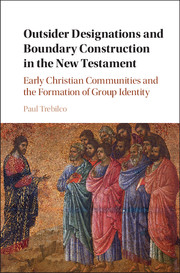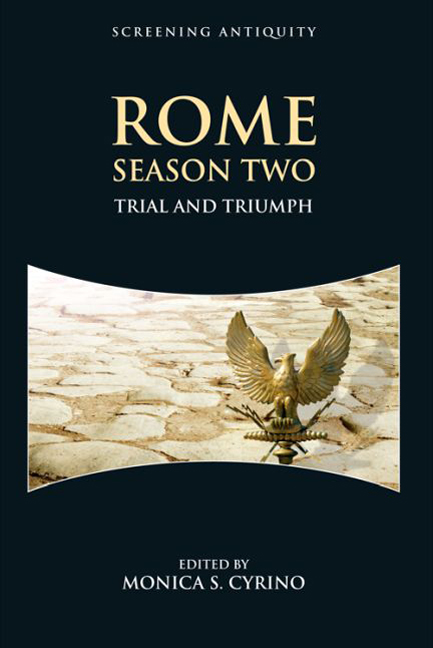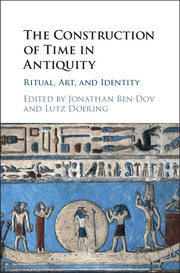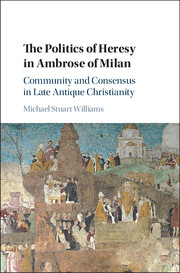Refine search
Actions for selected content:
23989 results in Ancient history
5 - Real and Constructed Time in Babylonian Astral Medicine
-
-
- Book:
- The Construction of Time in Antiquity
- Published online:
- 06 October 2017
- Print publication:
- 12 October 2017, pp 69-82
-
- Chapter
- Export citation
Commentary
-
- Book:
- Land and Taxes in Ptolemaic Egypt
- Published online:
- 17 October 2017
- Print publication:
- 12 October 2017, pp 91-92
-
- Chapter
- Export citation

Outsider Designations and Boundary Construction in the New Testament
- Early Christian Communities and the Formation of Group Identity
-
- Published online:
- 11 October 2017
- Print publication:
- 26 October 2017

Rome Season Two
- Trial and Triumph
-
- Published by:
- Edinburgh University Press
- Published online:
- 07 October 2017
- Print publication:
- 18 May 2015

The Construction of Time in Antiquity
- Ritual, Art, and Identity
-
- Published online:
- 06 October 2017
- Print publication:
- 12 October 2017

The Politics of Heresy in Ambrose of Milan
- Community and Consensus in Late Antique Christianity
-
- Published online:
- 06 October 2017
- Print publication:
- 19 October 2017
10 - Greeks, Scythians, Parthians and Kushans in Central Asia and India
- from Part IV - Archaeology of Eurasian Empires
-
-
- Book:
- Eurasian Empires in Antiquity and the Early Middle Ages
- Published online:
- 12 October 2017
- Print publication:
- 05 October 2017, pp 205-250
-
- Chapter
- Export citation
Maps
-
- Book:
- Eurasian Empires in Antiquity and the Early Middle Ages
- Published online:
- 12 October 2017
- Print publication:
- 05 October 2017, pp ix-xi
-
- Chapter
- Export citation
Copyright page
-
- Book:
- Eurasian Empires in Antiquity and the Early Middle Ages
- Published online:
- 12 October 2017
- Print publication:
- 05 October 2017, pp i-iv
-
- Chapter
- Export citation
Contributors
-
- Book:
- Eurasian Empires in Antiquity and the Early Middle Ages
- Published online:
- 12 October 2017
- Print publication:
- 05 October 2017, pp xiii-xiii
-
- Chapter
- Export citation
Index
-
- Book:
- Eurasian Empires in Antiquity and the Early Middle Ages
- Published online:
- 12 October 2017
- Print publication:
- 05 October 2017, pp 313-317
-
- Chapter
- Export citation
7 - Homer and the Shi Jing as Imperial Texts
- from Part III - Cultural Legacies of Eurasian Empires
-
-
- Book:
- Eurasian Empires in Antiquity and the Early Middle Ages
- Published online:
- 12 October 2017
- Print publication:
- 05 October 2017, pp 151-152
-
- Chapter
- Export citation
1 - The Political Organization of Steppe Empires and their Contribution to Eurasian Interconnectivity: the Case of the Huns and Their Impact on the Frankish West
- from Part I - Political Organization and Interactions of Eurasian Empires
-
-
- Book:
- Eurasian Empires in Antiquity and the Early Middle Ages
- Published online:
- 12 October 2017
- Print publication:
- 05 October 2017, pp 13-14
-
- Chapter
- Export citation
Dedication
-
- Book:
- Eurasian Empires in Antiquity and the Early Middle Ages
- Published online:
- 12 October 2017
- Print publication:
- 05 October 2017, pp i-iv
-
- Chapter
- Export citation
4 - Honour and Shame in the Roman Republic*
- from Part II - Socio-Institutional Aspects of Eurasian Empires
-
-
- Book:
- Eurasian Empires in Antiquity and the Early Middle Ages
- Published online:
- 12 October 2017
- Print publication:
- 05 October 2017, pp 83-84
-
- Chapter
- Export citation
6 - Slavery and Forced Labour in Early China and the Roman World
- from Part II - Socio-Institutional Aspects of Eurasian Empires
-
-
- Book:
- Eurasian Empires in Antiquity and the Early Middle Ages
- Published online:
- 12 October 2017
- Print publication:
- 05 October 2017, pp 110-132
-
- Chapter
- Export citation
Conclusion
-
-
- Book:
- Eurasian Empires in Antiquity and the Early Middle Ages
- Published online:
- 12 October 2017
- Print publication:
- 05 October 2017, pp 275-312
-
- Chapter
- Export citation
Illustrations
-
- Book:
- Eurasian Empires in Antiquity and the Early Middle Ages
- Published online:
- 12 October 2017
- Print publication:
- 05 October 2017, pp vii-viii
-
- Chapter
- Export citation
Part IV - Archaeology of Eurasian Empires
-
- Book:
- Eurasian Empires in Antiquity and the Early Middle Ages
- Published online:
- 12 October 2017
- Print publication:
- 05 October 2017, pp 174-202
-
- Chapter
- Export citation
Part II - Socio-Institutional Aspects of Eurasian Empires
-
- Book:
- Eurasian Empires in Antiquity and the Early Middle Ages
- Published online:
- 12 October 2017
- Print publication:
- 05 October 2017, pp 60-82
-
- Chapter
- Export citation
